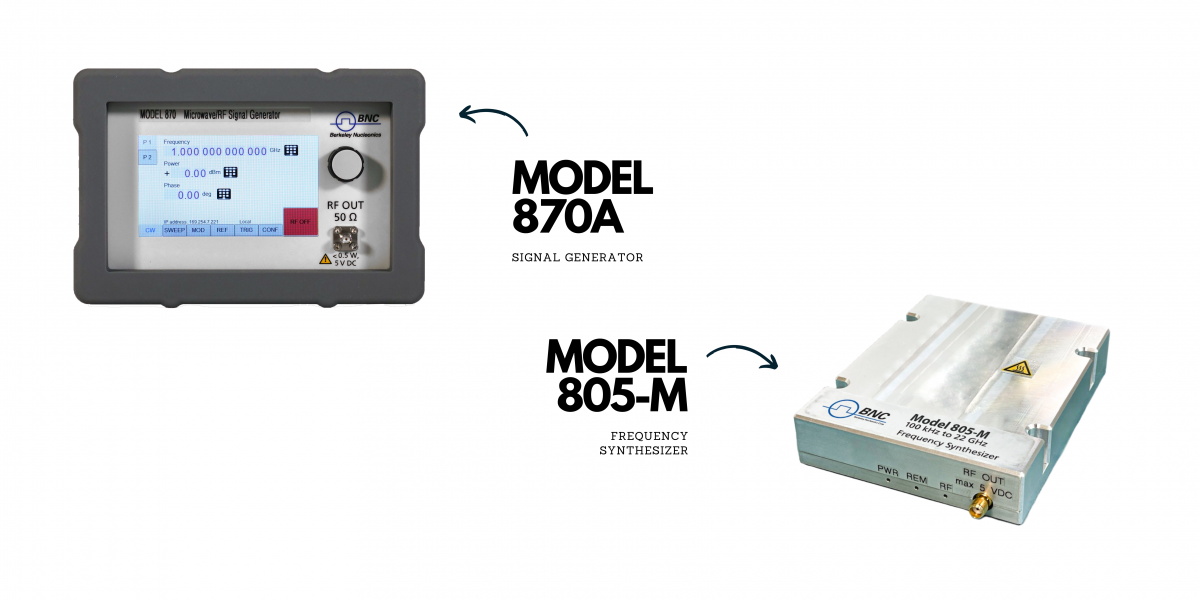January 10, 2024 - Understanding the Differences: RF Signal Generators vs. RF Synthesizers
In the realm of radiofrequency (RF) technology, the creation of signals are fundamental. Two key instruments used in this domain are RF signal generators and RF synthesizers. Though they share the common goal of producing RF signals, the methodologies and applications of these tools differ significantly. In this post, we'll delve into the nuances of each, highlighting how they operate and their respective roles in RF engineering.

What is an RF Signal Generator?
An RF signal generator is a versatile and precise instrument used in the testing, design, and maintenance of radio frequency equipment and systems. It is capable of generating continuous wave (CW) signals at a set frequency. The hallmark of an RF signal generator is its ability to provide extensive control over various signal parameters such as frequency, amplitude, and modulation.
Key Features:
- Control and Precision: Users can finely tune the signal's frequency, amplitude, and phase. This precise control is crucial for applications requiring detailed signal characteristics.
- Modulation Capabilities: RF signal generators can modulate signals in several ways (AM, FM, PM) to simulate different communication scenarios.
- Signal Purity: They typically produce signals with low phase noise and high stability, which is essential for accurate testing and measurement.
In contrast, and RF synthesizer is a type of signal generator that creates RF signals through a combination of frequency multipliers, dividers, and internal circuitry. The focus here is on synthesizing a frequency that is a close approximation of the desired output.
Key Features:
- Frequency Synthesis: Utilizes a reference signal and various electronic components to generate a wide range of frequencies.
- Flexibility: They can quickly switch between frequencies, making them suitable for applications requiring rapid frequency changes.
- Less Precision: While versatile, they generally offer less precision in setting exact signal parameters compared to RF signal generators.

Learn more: Model 870A Signal Generator and Model 805-M Frequency Synthesizer
Comparing the Two
Applications
- RF Signal Generators are often used in RF research, equipment design, and calibration. They are preferred in scenarios where signal integrity and precision are paramount, such as in laboratory settings or complex system diagnostics.
- RF Synthesizers, on the other hand, find their use in more dynamic environments. They are ideal for applications like telecommunications, where the ability to rapidly switch frequencies is more crucial than the absolute precision of each signal.
Cost and Complexity
- RF signal generators, with their advanced control features, tend to be more expensive and complex. They require a deeper understanding of RF principles to operate effectively.
- RF synthesizers, being less focused on precision, are generally more cost-effective and user-friendly, suitable to a broader range of users.
Precision vs. Flexibility
- The choice between these two tools often boils down to a trade-off between precision and flexibility. RF signal generators offer meticulous control over signal parameters, making them ideal for detailed analytical work. In contrast, RF synthesizers provide quick frequency adjustments, catering to dynamic operational needs.
In RF engineering, the roles of RF signal generators and RF synthesizers are pivotal. Choosing the right one is crucial and depends on the specific needs of your RF application. If you're looking for precision and meticulous control, an RF signal generator is ideal. Alternatively, if your priority is adaptability and swift frequency switching, an RF synthesizer fits the bill. The decision between these two depends on your project's unique requirements and the level of signal accuracy required. For those in need of either, Berkeley Nucleonics RF Division offers a comprehensive selection. Discover more about our products at this link.
